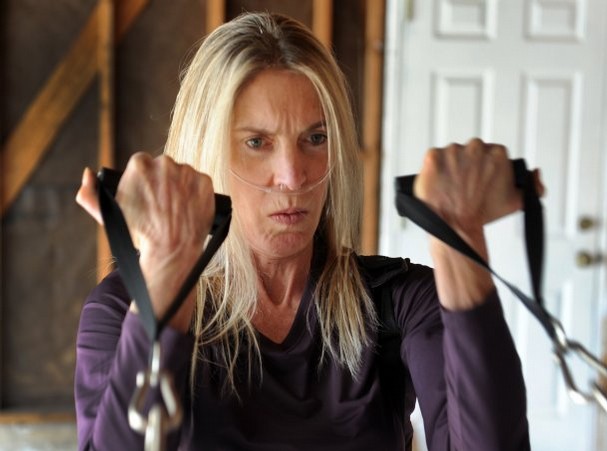Little-known disease pushes life to the edge
Karen Erickson was told she had two years to live 11 years ago.
 The 45-year-old Thousand Oaks woman with lungs that work at less than 20 percent was diagnosed with a disease so little-known that the physician's assistant who delivered the news didn't get it quite right.
The 45-year-old Thousand Oaks woman with lungs that work at less than 20 percent was diagnosed with a disease so little-known that the physician's assistant who delivered the news didn't get it quite right.
"She said: 'You have alpha-1 antitrypsin deficiency. Your body is eating your own lungs," Erickson said. "She said, 'There's no cure, but if we get you on treatment, we think we could get you a couple more years.' ... I thought: What the hell?"
Today, the biotech training manager wears a black backpack for the small tank that delivers oxygen through clear tubes that hiss when she inhales. She uses two tanks when she pedals the wheels of her stationary bike at a speed that wouldn't keep her upright outdoors.
Everything in her life — the exercise, the 50-foot lifeline that leashes her to an oxygen concentrator when she sleeps, the speeches to people with similar disorders and the double lung transplant she hopes will come within a year — return to one goal. She wants to help people understand the disease that forced her to take control of her life.
"It's her attitude," said Dr. Sandy Sandhaus, a friend and medical director of the Alpha 1 Foundation in Miami. "That sounds kind of hokey, but it has to do with whether you believe what someone tells you or you choose to fight. She's definitely a fighter. ... Instead of going and hiding in her room, she got on her bike and started riding."
Alpha-1 deficiency is a hereditary disease in which defective genes rob the liver of some of its ability to produce the alpha-1 antitrypsin protein. In some cases, the protein can't be released from the liver and builds up there, killing cells and causing cirrhosis-type scarring.